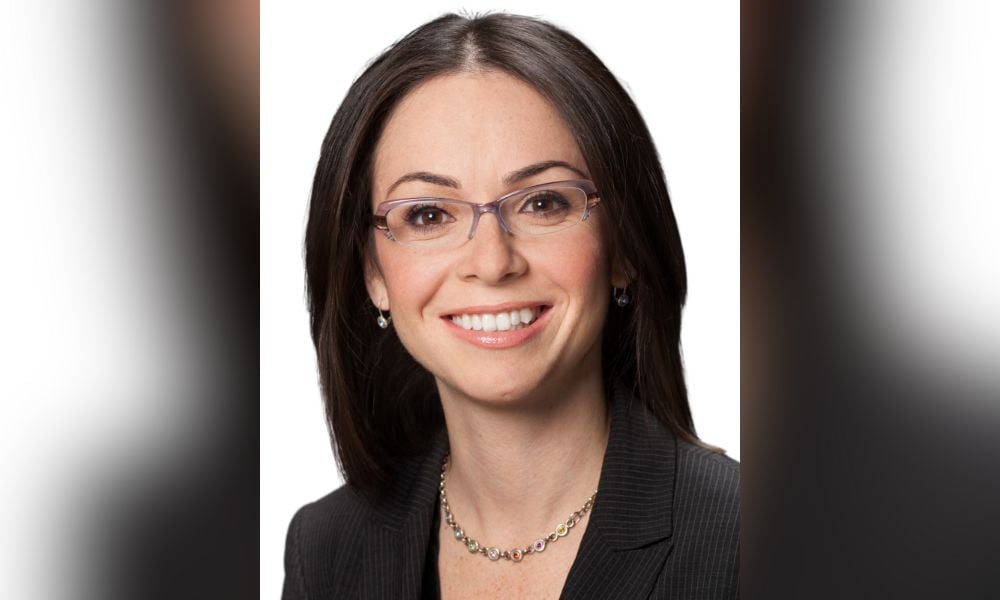
Pandemic 'opened the space' to develop and use e-teaching tools: Osgoode's Stephanie Ben-Ishai

COVID-19 might have spurred interest in improving virtual learning experiences, but Osgoode Hall law professor Stephanie Ben-Ishai at York University says that her desire to build better tools for teaching started long before the pandemic.
COVID “opened the space where people were more open to learning about virtual tools for teaching and having discussions about it,” she says, “whereas earlier, it might have been dismissed in favour of a traditional law school classroom environment.”
The audio-visual technology used for piloting in a contract law course called Teaching and Learning Law in the Metaverse anticipates potential responses to questions and pushes students to come up with questions themselves, providing automatic feedback.
Ben-Ishai developed the technology in partnership with Western University law professor David Sandomierski (whose Ph.D. thesis topic was on teaching contract law) and a team of software developers.
A $100,000 grant under the Ontario government’s Virtual Learning Strategy initiative helped develop the tool. “We’re trying to see if we can leverage technology to offer something better than the Zoom experience and to mimic the classroom, as well as the client, experience,” she says.
Ben-Ishai says the virtual learning tool does not use artificial intelligence because AI can’t teach students to conceptualize problems and address people’s lived experiences.
A background in legal education using virtual technology
After completing testing and quality-assurance work in February, the virtual learning tool is now part of the Ontario government’s eCampus Ontario site for open access. Both Ben-Ishai and Sandomierski plan to continue to pilot the technology in the classroom.
Ben-Ishai has devoted a lot of time and thought to develop new educational tools since joining the Osgoode faculty in 2003. In 2004, she participated in a 10-week faculty development course called do TEL (Technology Enhanced Learning) led by professor Avi Cohen, which has “inspired both my teaching and research since that time.”
She adds that she has a long history of developing technology-enhanced learning environments as the Director of the Bankruptcy and Insolvency LLM at Osgoode Professional Development Program, Co-Director of the Banking and Financial Law LLM at OPD, and currently as Founding Director of the Financial Law LLM at OPD.
“All of these programs include both in-person and high-quality technology-enhanced learning as part of their curriculum,” she says, aiming to improve “experiential learning” through technology.
Developing an experiential virtual teaching tool
She says the tool developed for the contract law course could expand to other classes. She has already tried it with students in her Osgoode Business Clinic and Commercial Law LLM programs.
Ben-Ishai says the goal has not necessarily been to develop stand-alone virtual courses but to see if technology can “fill gaps” that current classroom or virtual methods don’t provide and make some aspects of learning “more accessible to students.”
She notes that she and Sandomierski could not locate any “off the shelf” tools that were affordable and could create user-generated simulations that “attempt to use the metaverse to transcend the challenges associated with obtaining true experiential learning experiences.” The tool developed by Ben-Ishai and Sandomierski allows students to pose questions, define goals, and collaborate with peers.
While the best way to understand the pilot project is to “actually experience it,” Ben-Ishai describes it as offering scenarios in a client’s voice, asking for advice and then asking for the student’s feedback. At the same time, the student can keep a record of the experience by writing down thoughts that can be sent to an instructor who can give feedback or use it in a classroom setting.”
For example, one of the simulations involves a client asking a lawyer (in this case, the student) for advice on a contract and how it compares to terms set out in an email agreement. The student is asked to answer questions such as “Are the additional terms of the written contract enforceable? What arguments would you make to show there are some problems with the written contract signed?"
Ben-Ishai says the provincial money to develop the tool was welcome, as developing programs at the early stages can be expensive.
Since launching its Virtual Learning Strategy (VLS) in December 2020, the Ontario Ministry of Colleges and Universities has invested $57 million in more than 395 projects led by the province’s universities, colleges and Indigenous institutes. The VLS aims to significantly expand options for traditional and life-long learning through the accelerated use of both online and hybrid learning.
Osgoode Hall law school dean Mary Condon says law students will benefit from Ben-Ishai’s innovative research.
“I am delighted to see colleagues with a deep understanding of their scholarly field create meaningful tools that enhance the student experience,” she said. “As contract law is a first-year subject, JD students will be introduced early to the possibilities this technology offers.”